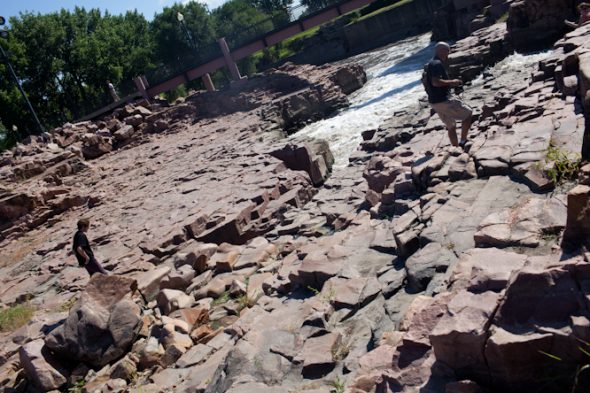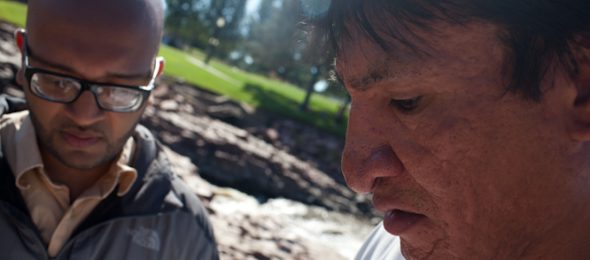
By Aman Ali
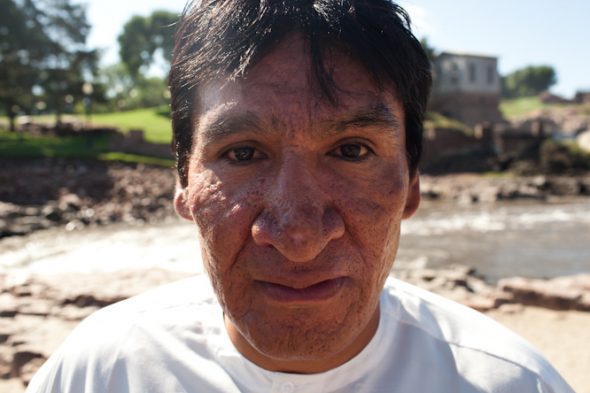
Basheer pointed to his gleaming skin and said the no-facial hair stereotype about Native Americans is true.
“Open up a history book and you’re not going to see Geronimo or Sitting Bull with a beard or nothin’” he said.
“Wow, I think you’re probably the least hairiest Muslim I’ve ever met,” I quipped back.
Basheer Butcher is a full-blooded Native American that converted to Islam in 2001. He hails from the Sioux tribe and grew up on the Cheyenne River Reservation in South Dakota. He now lives in Sioux Falls and is active in the Muslim community here of about 3,000 people.
We chatted at length by kicking back on some stones in front of a gaping waterfall in a nearby park. He said he may have abandoned certain traditions in his culture when he embraced Islam, but becoming Muslim actually strengthened his Native American identity.
“A lot of virtues in Native American culture are very similar to values in Islam like sincerity, courage, wisdom and generosity,” he said. “My whole life I was searching for this connection with God and with Islam I felt like I finally found it.”
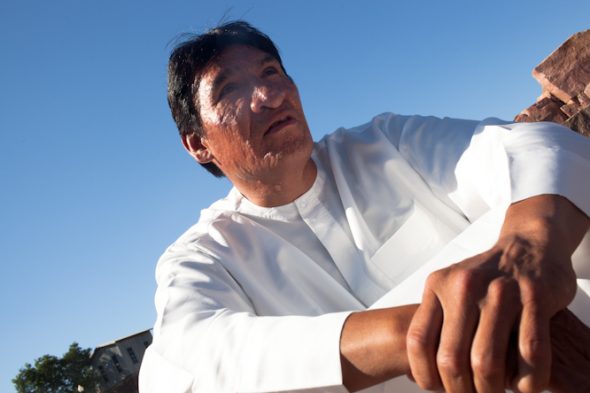
Basheer has a towering physique and a distinguishable face that looks like it was chiseled from stone. He wears a soothing sandlewood cologne and speaks with a gentle tone that brought comfort to my senses in more ways than one. When he began opening up about his life, he often reflected with brief pauses before he spoke giving me the impression it’s been a rocky journey to get to where he is today.
Basheer’s birth name is Louis Butcher Jr. and his family name is High Elk. Growing up on a Sioux reservation, he had a rough upbringing and was in search for divine answers to understand what he was dealing with.
“My father was an alcoholic and my parents got divorced when I was really young,” he said. “I had a lot of anger and feelings of resentment because I couldn’t make sense of anything.”
He also had his own demons. He battled with alcoholism and got into fights on the reservation that landed him in and out of jail. He said he never felt much of a connection with many of his Native American spiritual traditions like sweat lodges, a ritual where you ask tribe leaders to pray to spirits on behalf of you.
“I never understood why did I have to tell someone to talk to the spirits or God for me,” he said. “Why can’t I connect to God directly? My whole life that’s what I was seeking.”
He left the reservation at age 31 and moved to a small town in South Dakota called Rapid City. That’s where he met a co-worker that embraced Islam. Basheer was intrigued and in 2001 began researching the religion.
9/11 happened in midst of his studying of Islam and I asked if that tragedy altered his views of the religion.
“I already had my mind made up about being Muslim when 9/11 occurred,” he said. “I saw what was going on with the backlash and how Muslims were getting attacked. Going through what my people have gone through for the past 250 years in this country and seeing what the Muslims were going through, I felt that connection.”
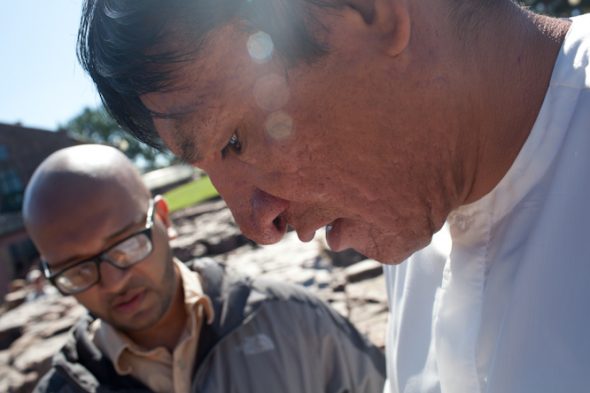
Basheer’s family speaks Lakota, a Native American language that uses many throat sounds found in Arabic. He shared with me a Lakota proverb that helped lead him on his journey to Islam.
“In Lakota, we have a saying – Mitaku Oyasin,” he said. “It means ‘We are all related’.”
Through God, he said, he felt more connected to humanity and the environment. It was the connection he had been seeking his whole life. His family wasn’t upset with him leaving behind his Native American spiritual traditions, especially his grandmother.
“When I became Muslim, my grandmother told me a Lakota proverb – Taku oyagagmi hantas ihab ichuwo,” he said writing down the proverb on my notepad. “That means ‘If you don’t understand something, then leave it.’”
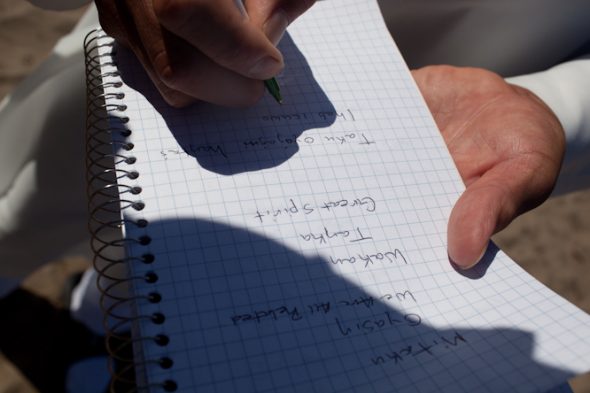
I drove Basheer home to his apartment at night and we passed by a Native American woman that seemed to be drunk as she stumbled down a sidewalk. Basheer’s face began to ache looking at the window before he quickly turned away.
“Alcoholism is one of the biggest problems Native Americans face anywhere,” he said. “A lot of people deal with their issues by turning to alcohol. Before I was Muslim I had a problem with it. Inshallah (God willing) I will never have to live that life again. It took my father’s life when he was 41 years old and it took my mother’s life in a fatal car accident when she was 36 years old. Being a Muslim and trying hard to be a good Muslim made a big change in my life.”
He may not practice many Native American customs he grew up on, but Basheer emphasized he doesn’t look down on his peers for doing them.
“Everyone has their own sense of a higher power whether it be a connection to God or spirits,” he said.
This year marks 10 years since Basheer has been Muslim. Given his tumultuous past, I asked him where he thinks he’d be today if he wasn’t Muslim. It was a heavy question for him to process and he looked away and took in a few deep breaths before he answered.
“You know, that’s something that’s always in the back of my mind but I try to keep things in a positive perspective,” he said. “Allah has blessed me and I’m always trying to do something good and focus on change in my life.”
“It’s always a worry for me to slip and go back to my old ways,” he added. “But as a believer in God, our faith is always going to go up and down. It’s always important to keep that in perspective to avoid going astray.”
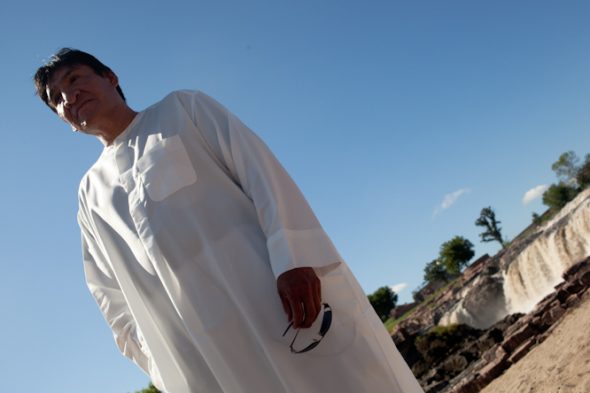
With Islam in his life, I asked him if he has been able to find the answers he was seeking when he began longing for his connection to God as a child.
“Everything happens by Allah’s will,” he said. “All the things I experienced, they happened for a reason and made me the person I am today. There is a connection to everything in this world through Allah.”
Our conversation ended there and I drive away and get a phone call from a friend in New York. I’m quickly pulled out of the spiritual high I was on talking to Basheer to deal with some petty drama my friend had dropped on me. While on the phone, I scratch my nose and notice Basheer’s sandlewood scent is still on my hand. I’m reminded about the connections I have to people in this world and to roll my eyes at my friend’s problem would be rolling my eyes at God’s beauty. I immediately give my friend the time of day he deserves.
Basheer is right, we are all related.
